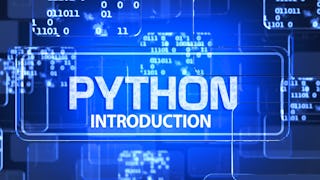Filter by
SubjectRequired
LanguageRequired
The language used throughout the course, in both instruction and assessments.
Learning ProductRequired
LevelRequired
DurationRequired
SkillsRequired
SubtitlesRequired
EducatorRequired
Explore the Computational Finance Course Catalog
 Status: NewStatus: Free Trial
Status: NewStatus: Free TrialCoursera Instructor Network
Skills you'll gain: Ledgers (Accounting), Prompt Engineering, Tax Planning, Large Language Modeling, Auditing, LLM Application, Tax Compliance, Income Tax, Portfolio Management, Generative AI, Cash Flow Forecasting, Fraud detection, Financial Forecasting, Financial Analysis, Responsible AI, Financial Auditing, Analysis, Oracle Cloud Applications, Artificial Intelligence, Risk Management
 Status: Free Trial
Status: Free TrialColumbia University
Skills you'll gain: Portfolio Management, Derivatives, Financial Market, Securities (Finance), Investment Management, Financial Systems, Asset Management, Credit Risk, Mortgage Loans, Mathematical Modeling, Applied Mathematics, Financial Trading, Financial Modeling, Risk Modeling, Financial Services, Securities Trading, Regression Analysis, Market Liquidity, Capital Markets, Actuarial Science
 Status: NewStatus: Preview
Status: NewStatus: PreviewUniversity of Maryland, College Park
Skills you'll gain: Accounting and Finance Software, Unstructured Data, Financial Data, Financial Statement Analysis, Image Analysis, Finance, Financial Analysis, Accounting, Emerging Technologies, Artificial Intelligence, Text Mining, Financial Reporting, Artificial Intelligence and Machine Learning (AI/ML), Machine Learning, Trend Analysis, Data-Driven Decision-Making, Natural Language Processing
 Status: Free Trial
Status: Free TrialEDHEC Business School
Skills you'll gain: Investment Management, Portfolio Management, Asset Management, Risk Analysis, Financial Modeling, Risk Management, Financial Analysis, NumPy, Probability Distribution, Python Programming, Simulations, Pandas (Python Package), Matplotlib, Data Manipulation
 Status: Preview
Status: PreviewUniversity of Washington
Skills you'll gain: Supervised Learning, Network Model, Matlab, Machine Learning Algorithms, Artificial Neural Networks, Computer Vision, Computer Science, Reinforcement Learning, Computational Thinking, Mathematical Modeling, Biology, Linear Algebra, Information Architecture, Differential Equations, Probability & Statistics
 Status: Free Trial
Status: Free TrialMultiple educators
Skills you'll gain: Tensorflow, Keras (Neural Network Library), Machine Learning, Google Cloud Platform, Machine Learning Algorithms, Applied Machine Learning, Financial Trading, Reinforcement Learning, Supervised Learning, Data Pipelines, Time Series Analysis and Forecasting, Statistical Machine Learning, Technical Analysis, Deep Learning, Securities Trading, Portfolio Management, Market Trend, Artificial Intelligence and Machine Learning (AI/ML), Financial Market, Artificial Neural Networks
What brings you to Coursera today?
 Status: Free Trial
Status: Free TrialCoursera Instructor Network
Skills you'll gain: Generative AI, Fraud detection, Predictive Analytics, Financial Services, Personalized Service, Financial Modeling, Financial Trading, Financial Reporting, FinTech, Compliance Management, Artificial Intelligence, Risk Analysis, Emerging Technologies, Banking, Investment Management, Automation
 Status: Preview
Status: PreviewSkills you'll gain: Derivatives, Financial Market, Risk Modeling, Mathematical Modeling, Financial Modeling, Credit Risk, Risk Management, Portfolio Management, Probability, Differential Equations, Applied Mathematics, Probability Distribution, Calculus
 Status: Preview
Status: PreviewCoursera Instructor Network
Skills you'll gain: Generative AI, Financial Trading, Market Data, Portfolio Management, Technical Analysis, Prompt Engineering Tools, Market Trend, Real Time Data, Automation, Python Programming, Predictive Modeling, Time Series Analysis and Forecasting, Risk Management
 Status: Preview
Status: PreviewThe Hong Kong University of Science and Technology
Skills you'll gain: Statistical Inference, Statistical Methods, Pandas (Python Package), Probability & Statistics, Risk Analysis, Financial Trading, Financial Data, Data Manipulation, Statistical Analysis, Regression Analysis, Financial Analysis, Jupyter, Probability Distribution, Python Programming, Data Visualization
 Status: Free Trial
Status: Free TrialUniversity of Michigan
Skills you'll gain: Market Data, Loans, Finance, General Finance, Corporate Finance, Securities (Finance), Mortgage Loans, Financial Market, Equities, Investments, Financial Analysis, Financial Data, Business Valuation, Investment Management, Microsoft Excel, Financial Management, Financial Forecasting, Business Mathematics, Financial Planning, Financial Modeling
 Status: NewStatus: Free Trial
Status: NewStatus: Free TrialSaïd Business School, University of Oxford
Skills you'll gain: FinTech, Financial Inclusion, Financial Services, Responsible AI, Data Ethics, Artificial Intelligence, Mobile Banking, Banking Services, Data Sharing, Financial Systems, Data Governance, Application Programming Interface (API), Financial Data, Financial Regulation, Finance, Artificial Intelligence and Machine Learning (AI/ML), Business Ethics, Innovation, General Data Protection Regulation (GDPR), Natural Language Processing
Computational Finance learners also search
In summary, here are 10 of our most popular computational finance courses
- AI-Powered Finance: Forecasting, Planning & Reporting: Coursera Instructor Network
- Financial Engineering and Risk Management: Columbia University
- AI Applications in Accounting and Finance: University of Maryland, College Park
- Introduction to Portfolio Construction and Analysis with Python: EDHEC Business School
- Computational Neuroscience: University of Washington
- Machine Learning for Trading: New York Institute of Finance
- Introduction to Generative AI in Finance: Coursera Instructor Network
- Pricing Options with Mathematical Models: Caltech
- GenAI for Algorithmic Trading: Coursera Instructor Network
- Python and Statistics for Financial Analysis: The Hong Kong University of Science and Technology










